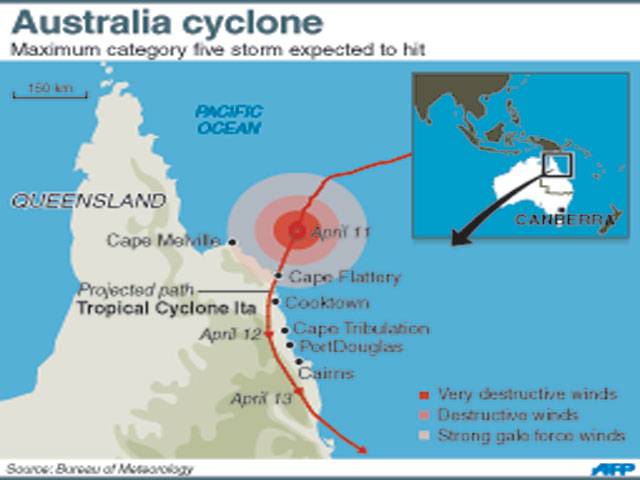SYDNEY : A cyclone packing winds of up to 230 kilometres (140 miles) an hour hit Australia’s Great Barrier Reef coast Friday night, officials said, as tens of thousands of people hunkered down amid warnings of devastation.
Cyclone Ita, while downgraded from a maximum level five to a weakening category four storm, still threatened fierce gales around Cooktown, some 1,600 kilometres from Brisbane.
Cyclone Ita made landfall at Cape Flattery and was 65 kilometres north of the coastal resort of Cooktown, and 230 kilometres north northwest of Cairns at about 9:00 pm (1100 GMT).
“(Ita) is crossing the coast near Cape Flattery with very destructive winds to 230 kilometres per hour near the core and gales extending out to 185 kilometres from the centre,” the Bureau of Meteorology said.
The storm was moving at 12 kilometres per hour and was “expected to continue moving south-southwest overnight and gradually weaken”.
Nonetheless winds gusting in excess of 125 kilometres per hour were expected to develop between Cape Melville and Cooktown during the night and possibly as far south as Port Douglas during Saturday morning.
Gales may extend south to the city of Cairns during Saturday, the bureau said.
“It’s still a destructive cyclone which has very strong winds,” Queensland Premier Campbell Newman said, adding some 9,000 people in Cooktown and to its north were “staring down quite a destructive cyclonic event”.
A total of 30,000 further south were urged to evacuate and a warning zone extended beyond Cooktown, a coastal community of 2,400 people, through the main transit hubs of Port Douglas and Cairns.
Newman warned that homes built prior to 1985 when new building regulations were enacted may not withstand the impact of the storm, and urged residents in the path of the menacing storm to head to local cyclone shelters.
“Anything over 80 kilometres (per hour) is dangerous,” Cook Shire mayor Peter Scott told the Australian Broadcasting Corp. (ABC).
“Anything over 80K will put a piece of tin through you and chop your head off, it will lift roofs off, it will make severe damage so the best place to be is staying inside,” he said.
Scott said that in the view of one senior police officer in the area, “the Cooktown you see today won’t be here tomorrow”.
Tropical storms are common in northeast Australia. This one is stronger but not as widespread as the monster Cyclone Yasi system which tore through the region just over three years ago, ripping homes from their foundations and devastating crops.
The Bureau of Meteorology also warned of heavy rainfall possibly leading to flash flooding, and coastal inundation from a storm surge.
The possibility of dangerous surges prompted warnings for people to evacuate parts of Cairns south of Cooktown, with the ABC reporting that 30,000 people had been advised to seek shelter elsewhere.
The power of storm surges was shown in November when Super Typhoon Haiyan pummelled the Philippines with record winds of 315 kilometres an hour, with entire towns wiped out when tsunami-like waves crashed hundreds of metres (feet) inland.
Australia is much better equipped to handle natural disasters than its Asian neighbour. Nevertheless, Premier Newman warned that in the worst-case scenario, storm surges of up to two metres above normal high tides could hit areas including Cairns, depending on the cyclone’s path.
“I want people to know the government has done everything it possibly can and after the event, we’re mobilising to get in and help the affected communities,” he added, while warning that telephone and electricity lines could be down temporarily after the storm passes.
Brendan Cullen, manager of the Sovereign Resort Hotel, one of three hotels in Cooktown, said locals were used to cyclones and had prepared their homes and businesses by taping up windows and securing debris.
But he said concerns were growing. “We’re worried about it landing right on top of us and the storm surge.
“As far as the general feeling in town, it’s a windy place anyway so it’s not as if there’s a lot of debris lying around,” he told AFP.
“At this particular junction there’s a bit of anxiety. It stands to reason that if it comes this way with those winds... there’s going to be some sort of damage in town.”
Friday, April 19, 2024
Powerful cyclone hits Australia’s Barrier Reef coast

Caption: Powerful cyclone hits Australia’s Barrier Reef coast
8:27 AM | April 19, 2024
8:09 AM | April 19, 2024
No damage to Iranian nuclear sites after Israeli airstrikes, says UN nuclear watchdog
12:50 PM | April 19, 2024
Ch Shafay visits Directorate of Consumer Protection Council
April 19, 2024
ECP reviews arrangements for by-elections in Punjab
April 19, 2024
Punjab’s price control initiative: A welcome step
12:33 PM | April 19, 2024
A Tense Neighbourhood
April 19, 2024
Dubai Underwater
April 19, 2024
X Debate Continues
April 19, 2024
Hepatitis Challenge
April 18, 2024
IMF Predictions
April 18, 2024
Kite tragedy
April 19, 2024
Discipline dilemma
April 19, 2024
Urgent plea
April 19, 2024
Justice denied
April 18, 2024
AI dilemmas unveiled
April 18, 2024
ePaper - Nawaiwaqt
Advertisement
Nawaiwaqt Group | Copyright © 2024





